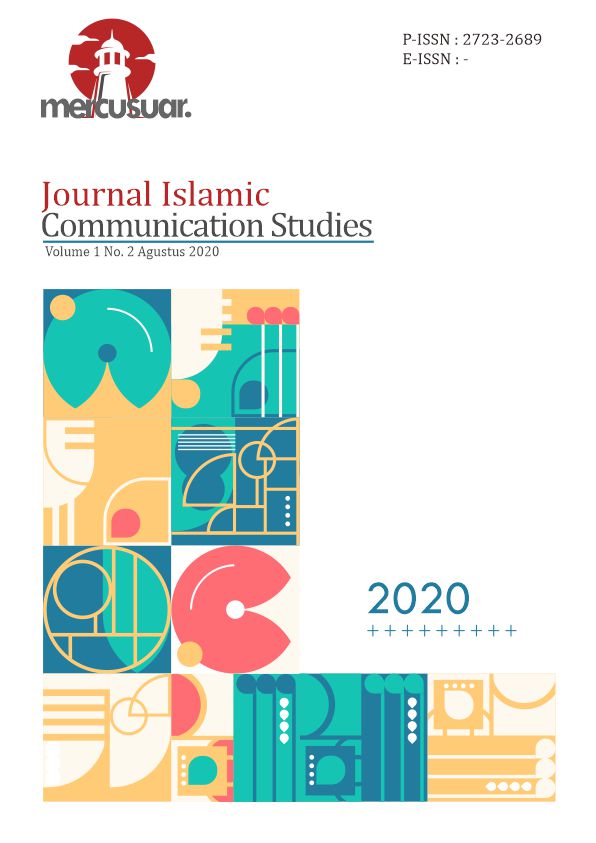Local Cultural Wisdom in the Perspective of Dakwah (A Study on the Values of Dakwah in the Culture of Peta Kapanca Labo Compo Sampari during the Suna Ro Ndoso Ceremony)
Abstract
The procession of the Suna Ro Ndoso ceremony in the Mbojo tribe has become a traditional and important ritual process for its people. The Suna Ro Ndoso procession is a customary heritage from their ancestors. Starting from these stories, it is important to know the origins of the customary process of the Suna Ro Ndoso ceremony that developed among the Bima community. Originally, the Bima community adhered to a belief system called Makamba labo Makimbi, which is now known as an Animism-Dynamism belief system, where the core belief is whatever they inherit from their ancestors. After Islam entered the land of Bima and became the basic reference for Dou Mbojo (the people of Bima), Islamic teachings became the inspiration for laws and regulations in the lives of the Bima people, both for ordinary people and those in the royal circle. In addition, preachers made the customs and traditions that developed in Bima as a medium of da'wah so that in the lives of the Bima people, some aspects are colored and influenced by Islamic teachings. It is no wonder, then, that the Bima people today have customs and traditions that are influenced by Islam, one of which is the Ziki LaboPeta Kapanca in the Suna Ro Ndoso ceremony.
Downloads
References
Ali, Baharuddin. “Prinsip-Prinsip Dakwah
Antarbudaya” jurnal dakwah
Tabligh: media pengkajian Dakwah
Dan Komunikasi Islam, edisi XXV,
Juni 2012.
Amin, M. Masyhur. Dakwah Islam dan
Pesan Moral. Cet. II; Yogyakarta:
Kurnia Kalam Semesta, 2002.
Aminullah Muhammad dan Nasaruddin
“Wajah Islam Nusantara Pada
Tradisi Peta Kapanca Dalam
Perkawinan Adat Bima”, Tajdid :
Jurnal Pemikiran Keislaman dan
Kemanusiaan, Vol. 1 no.1 (2017).
Arifuddin, Metode Dakwah Dalam
Masyarakat. Cet. I; Makassar:
Alauddin University, 2011.
Arikunto, Suharsimi. Prosedur Penelitian
Suatu Pendekatan Praktis. Jakarta:
Rineka Cipta, 2000.
Fajrin, “Nilai-Nilai Pendidikan Islam Dalam
Pelaksanaan Zikir Labo Peta
Kapanca Pada Acara Pernikahan di
Desa Rasabou Kecamatan Sape
Kabupaten Bima”. Tesis (Makassar:
PPs UIN Alauddin, 2017).
Ismail, M. Hilir dan Alan Malingi, Upacara
Daur Hidup Masyarakat Bima-
Dompu. Yogyakarta: Transglobal,
Ismail, M. Hilir. Kebangkitan Islam di Dana
Mbojo. Bogor Indonesia: Cv Binasti,
Jamil, Abdul. Islam dan Budaya Lokal.
Yogyakarta: Pokja Akademik, 2005.
Kahmad, Dadang. Sosiologi Agama. Cet. IV;
Bandung: PT. Remaja Rosdakarya,
Konsultan syariat Islam al-Khairat, “sunat
khitan dalam islam” (2014)
https://www.alkhoirot.net/2013/1
/sunat-khitan-dalam-islam.html
(diakses, 15 Oktober 2019).
Muhtadi, Asep Saeful. Metode Penelitian
Dakwah. Bandung: PustakaSetia,
Pawito, Penelitian Komunikasi Kualitatif.
Cet. I; Yogyakarta: PT. LKS
Yogyakarta 2008.
Rahman, M. Fachrir. Pernikahan Di Nusa
Tenggara Barat: Antara Islam dan
Tradisi. Mataram: LEPPIM IAIN
Mataram, 2013.
Rahman, M. Facrir. Islam Di Bima kajian
Historis Tentang Proses Islamisasi
Dan Perkembangannya Sampai
Masa Kesultanan. Yogyakarta:
Genta Press, 2009.
Said, Nurhidayat muh. Dakwah dan
Berbagai Aspeknya. Cet. I;
Makassar: Alauddin University
Press, 2014.
Said, Nurhidayat Muh. Metode Penelitian
Dakwah. Cet. I; Makassar: Alauddin
University Press, 2013.
Soekanto, Soerjono dan Budi Sulistyowati,
Sosiologi Suatu Pengantar. Jakarta:
Rajawali Pers, 2015.
Wahid, Abdul. “Dakwah Dalam
Pendekatan Nilai-Nilai Kearifan
Lokal: Tinjauan Dalam Perspektif
Internalisasi Islam dan Budaya”,
Jurnal: Tabligh, vol. 19 no. 1, (2018).
Wahid, Abdurrahman. dkk., Islam
Nusantara. Bandung: Mizan, 2016.
Wahyuni, Agama dan Pembentukan
Struktur Sosial: Pertautan Agama,
Budaya dan Trasdisi Sosial. Cet. I;
Jakarta: Prenadamedia Group,
Zuhdi, Muhammad Harfin., “Dakwah dan
Dialektika Alkuturasi Budaya”,
Jurnal: Religia, Vol. 15, No. 1
(2012).


